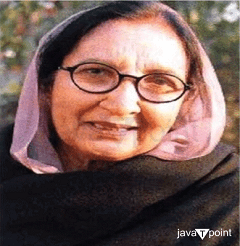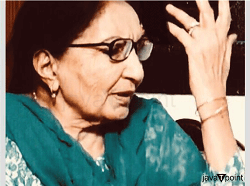Dalip Kaur Tiwana
In addition to being a writer, Dalip Kaur Tiwana, whose name is indelible in the history of modern Punjabi literature, was also a creative force that altered the genre of Punjabi narrative. Tiwana was born on May 4, 1935, in the sleepy town of Rabbon in the Ludhiana District of Punjab, British India. Her rise from these modest beginnings to the top rank of novels and short-story writers is a narrative of commitment, passion, and creative talent. Readers from different languages and cultural backgrounds continue to be moved by her legacy, which is characterized by a profusion of awards and an unmatched quantity of work. Early Years and Academic GoalsDalip Kaur Tiwana was raised in the warm embrace of a prosperous family that had property; this environment would later have an impact on the depth and richness of her narrative. In Patiala, where her uncle Sardar Sahib Tara Singh Sidhu held the prestigious job of Inspector General of Prisons, she began her scholastic career. She developed her mind in various academic settings and started a remarkable academic career. Tiwana's academic achievements include graduating with first-class honors from Panjab University, Chandigarh, where she pursued an M.A., as well as receiving a Ph.D. Academic Excellence and Creative BrillianceTiwana began her academic career at Punjabi University, Patiala, in 1963 as a lecturer. She then rose through the ranks to become a professor and the department's head of Punjabi. She delivered lectures in England, the U.S., and Canada, demonstrating that her intellectual brilliance was not restricted to national lines. Her prestige was raised by these worldwide interactions, and they also gave her the chance to win prizes for her significant contributions to literature. Novels and Short Stories Comprise the Literary OpusWith a wide range of novels, short tales, and essays, Tiwana's literary landscape is as varied as it is wide. Her books explore the hidden longings and repressed feelings of the oppressed, painting detailed images of rural life. Her stories combine tragedy with sarcasm, leaving a lasting impression on the reader's psyche. Her short works have won several honors and recognition for their sensitive explorations of the human psyche. Books That Hit HomeTiwana's books work as windows into the human condition, giving readers a glimpse into the thoughts and feelings of her characters. Literature like "Eho Hamara Jiwna," "Waat Hamari," and "Doosri Seeta" delves deeply into the lives of its protagonists, exposing their complexity, hardships, and ambitions. The fabric of Punjabi literature is further enriched by the distinctive emotional tapestry that each story bears. Psychic Engagement with Short StoriesThe sensitivity, resilience, and reflection that Tiwana captures in her short tales serve as microcosms of the range of human emotions. Her capacity to analyze the subtleties of the feminine brain and convey nuanced emotions strikes a powerful chord. Her skill at creating stories that speak to the very essence of human life is demonstrated by works like "Merian Saariyaan Kahaniyaan" and "Panchhiyaan Dian Kahaniyaan." Personal Journey
Tiwana's literary journey also includes her autobiography, which gives readers a close-up look at the events in her life. "Nange Pairaan Da Safar" gives a straightforward description of her life's development, charting the course of her creative spirit and the numerous obstacles she overcame. This work is proof of her bravery, tenacity, and everlasting dedication to her art. Unflinching Translations and EssaysBeyond her novels, Tiwana delves into literary criticism in her articles. Her insightful study of the literary scene is seen in works like "Tere Mere Sarokaar" and "Jeeun Joge," which deepens the breadth of her contributions. Her attempts to translate her writing into English further ensure that her tale crosses linguistic boundaries and makes Punjabi literature accessible to a larger audience. An Example and AppreciationNumerous accolades and honors that highlighted Dalip Kaur Tiwana's outstanding contributions to Punjabi literature were interspersed throughout her literary career. Her awards, which range from the Govt. of Punjab Award for "Sadhana," hailed as the greatest book of short tales, to the coveted Sahitya Akademi Award for "Eho Hamara Jeevna," illustrate the breadth of her influence on the literary community. Her reputation as a trailblazer is further cemented by the Ministry of Education and Social Welfare Award, the Nanak Singh Puruskar, and the Saraswati Samman. Legacy and VerdictBeyond the limitations of time and geography, Dalip Kaur Tiwana left behind a lasting impact. Her stories continue to enthrall readers of all ages because they capture the spirit of rural life and the complexity of human emotions. Contemporary Punjabi writing will never be the same because of Tiwana's propensity for delving deep into the human psyche, her unshakable commitment to her art, and her unrelenting desire to bring attention to the marginalized. Her writings will continue to act as a lighthouse, leading the next generations of authors and readers through the complex maze of human experiences as time goes on. AwardsAwarded the UGC National Lecturership in Academics. Literary
Next TopicDebina Bonnerjee
|
 For Videos Join Our Youtube Channel: Join Now
For Videos Join Our Youtube Channel: Join Now
Feedback
- Send your Feedback to [email protected]
Help Others, Please Share









